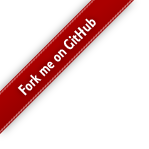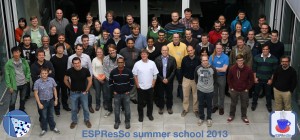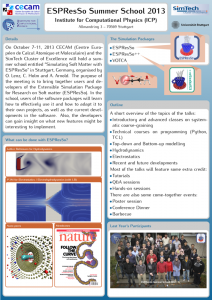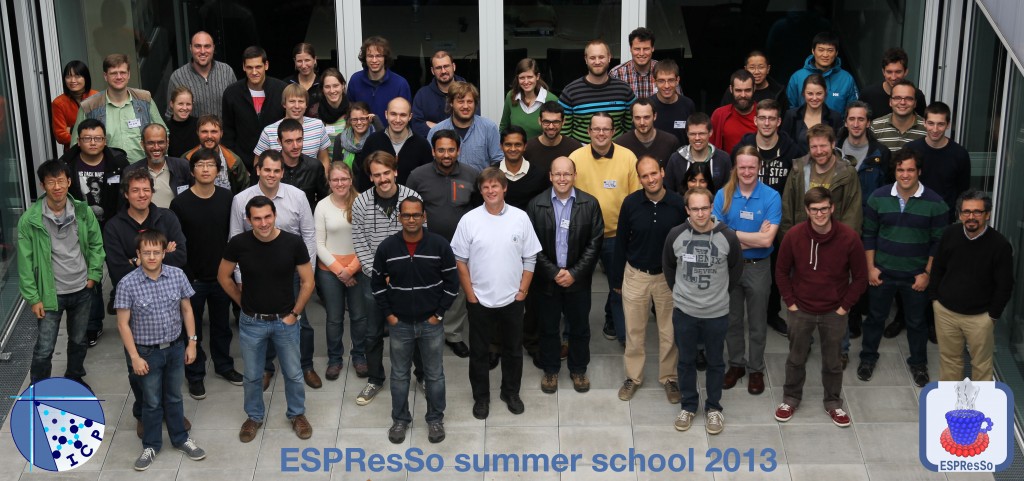Simulating Soft Matter with ESPResSo, ESPResSo++ and VOTCA
October 7, 2013 to October 11, 2013
Institute for Computational Physics, Stuttgart University, Germany
[tab name=”Contents”]
ESPResSo, ESPResSo++ and VOTCA are open-source program packages that have been designed specifically to study coarse-grained soft matter systems, and they are used by more than 100 institutions worldwide. The packages are developed at the ICP at Stuttgart University, Germany and the Max-Planck-Institute for Polymer Research in Mainz, Germany. All three applications are tools that make it significantly easier for PhD students and researchers in general toget started with their projects.
Between October 7-11, ICP, the SimTech Cluster of Excellence at Stuttgart University and CECAM (Centre Européen de Calcul Atomique et Moléculaire) organize the SimTech-CECAM-ESPResSo Summer School 2013. The school provides a detailed and hands-on introduction to the software packages and their uses.
The school consists of Lectures and Hands-on Sessions, both for beginners as well as for experienced users and developers of ESPResSo, ESPResSo++ and VOTCA. The introductory sessions aim to introduce the general ideas and usage of ESPResSo and its most common features for the simulation of a broad variety of soft matter systems. The advanced sessions are offering a more in-depth look into the code of the software and additional algorithms and possibilities of ESPResSo++, VOTCA and ADResS. It is aimed to attract researchers who are already familiar with the basic ESPResSo features and want to build on that or want to extend and optimize the code to better match their simulation setups.
Furthermore, there will be a Poster Session and Lightning Talks where participants have the opportunity to present their projects and ideas with the other participants and the speakers, and a number of Scientific Talks where scientists will present recent research projects that were done with any of the software packages. Another aim of this school is to give the developers of the software packages feedback on ongoing research on soft matter, so that design decisions better match the needs of the community.
[/tab][tab name=”Registration”]
To apply and register for the summer school, please send an informal email to ess@icp.uni-stuttgart.de. In the mailing, please include the following information:
- full name and affiliation (for the name tag)
- work address (for us to report to CECAM)
- level of experience with ESPResSo or ESPResSo++:
- “I am a beginner.”
- “I have written a Tcl/Python script for ESPResSo or ESPResSo++.”
- “I have had a look at the C-code of ESPResSo or ESPResSo++.”
- “I have done modifications or extensions to the code of ESPResSo or ESPResSo++.”
[/tab][tab name=”Details”]
(Non-)Support and (Non-)Fees
- Unfortunately, we are not able to provide financial support for travel or accommodation. You will have to access your own funding sources to cover these costs.
- There are no fees for the school itself.
- The following things are included for participants of the school
- Lunches (Monday to Friday)
- Coffee breaks and snacks (Monday to Friday noon)
- BBQ on Tuesday evening
Travel and Accommodation
- You will have to book your accommodation in Stuttgart yourselves. However, we have reserved a number of rooms (singles and doubles) in the International Student Hostel (from 25.50€ for students). Use the keyword “Espresso” to get one of the rooms from our contingency.[important]Please book your rooms as soon as possible, as the reservation are only valid for a limited time![/important]
- If the rooms in the International Student Hostel are all occupied, consider the ETAP hotel in Stuttgart.
- Stuttgart can be reached by plane (airport code STR) or by train (“Stuttgart Hauptbahnhof”). Both from the train station and the airport the ICP as well as the ETAP hotel can be reached easily by public transport. Details will follow on this page.
Poster Session and Lightning Talks
We want to give the participants ample opportunity to present their own work and ideas.
- On Monday evening (17:00-18:00), we will have Lightning Talk Session of one hour, where people can present a very short talk. Lightning talks are intended to present finished and unfinished ideas of projects to be discussed with interested people afterwards, or to tease people to your poster. Depending on how many people want to give a lightning talk, the time per talk will be adapted (probably something between 5 and 20 minutes). If you want to give a lightning talk, please send an email with the title to ess@icp.uni-stuttgart.de.
- We will hold a Poster Session (and a BBQ) on Tuesday evening where most people from our institute will put up their posters. If you have a poster that you would like to present, just bring it along! Note that the posters can most probably stay mounted on the poster walls during the whole school.
Further Details
- If you have a Laptop, please bring it along! We will have some desktop computers where you can do the hands-on sessions, but we recommend to bring your own machine. It should provide some kind of POSIX OS (i.e. basically anything but Windows).
- On Wednesday evening, we will have a Conference Dinner. Unfortunately, we cannot fund the dinner for the participants, but only for the speakers. Participants are invited to join the dinner, anyway.
- The school will end on Friday by 13:00, so that most people can still travel home on Friday. From ICP to Stuttgart airport you will need about 30 minutes.
[/tab][tab name=”Program”]
Monday, October 7th
| 8:30 – 9:00 | Registration | ||
|---|---|---|---|
| 9:00 – 9:30 | Welcome Olaf Lenz (ICP Stuttgart, Germany) [talk.pdf] |
||
| 9:30 – 10:30 | Lecture Introduction to Soft Matter Simulations Christian Holm (ICP Stuttgart, Germany) [talk.pdf] |
||
| 10:30 – 11:00 | Coffee Break | ||
| 11:00 – 11:30 | Lecture Speeding up and Parallelizing Molecular Dynamics Simulations Olaf Lenz (ICP Stuttgart, Germany) [talk.pdf] |
||
| 11:30 – 12:30 | |||
| 12:30 – 14:00 | Lunch break | ||
| 14:00 – 17:00 |
|
||
| 17:00 – 18:00 | Lightning Talks | ||
Tuesday, October 8th
| 9:00 – 11:15 |
|
|---|---|
| 11:15 – 11:45 | Coffee Break |
| 11:45 – 12:30 | Lecture Bottom-up Modelling: Systematic Coarse-Graining with VOTCA Denis Andrienko (MPIP Mainz, Germany) [talk.pdf] |
| 12:30 – 14:00 | Lunch break |
| 14:00 – 17:30 |
|
| 17:30 – | Poster Session and BBQ |
Wednesday, October 9th
| 9:00 – 10:30 | |
|---|---|
| 10:30 – 11:00 | Coffee Break |
| 11:00 – 12:30 |
|
| 12:30 – 14:00 | Lunch break |
| 14:00 – 17:30 |
|
| 17:30 – | Conference Dinner |
Thursday, October 10th
| 9:00 – 10:30 | |
|---|---|
| 10:30 – 11:00 | Coffee Break |
| 11:00 – 12:30 | |
| 12:30 – 14:00 | Lunch break |
| 14:00 – 17:30 |
|
Friday, October 11th (Scientific Talks)
| 9:00 – 9:30 | Transferable Coarse-grained Potential for Quantitative Protein Folding and Design Ivan Coluzza (University of Vienna, Austria) [talk.pdf] |
|---|---|
| 9:30 – 10:00 | Multiscale Methods for Complex Systems using AdresS and VOTCA Debashish Mukherji (MPIP Mainz, Germany) [talk.pdf] |
| 10:00 – 10:30 | Coffee Break |
| 10:30 – 11:00 | Obtaining the Bending Modulus from a Buckled Lipid Membrane Patrick Diggins (Carnegie-Mellon-University Pittsburgh, USA) [talk.pdf] |
| 11:00 – 11:30 | Crystallization of Charged Colloids ‒ when Hydrodynamics Matter Axel Arnold (ICP Stuttgart, Germany) [talk.pdf] |
| 11:30 – 12:00 | Wrap-up Olaf Lenz, Axel Arnold, Christian Holm (ICP, Germany) [worksheet.pdf] |
[/tab][tab name=”Useful links”]
- Homepage of ESPResSo
- Homepage of ESPResSo++
- Homepage of VOTCA
- Institute for Computational Physics, Stuttgart University, Germany (Home institution of ESPResSo, Organizing institution)
- Max-Planck-Institute for Polymer Research, Mainz, Germany (Home institution of ESPResSo++ and VOTCA)
[/tab][tab name=”Participants”]
Speakers
- Axel Arnold, Institute for Computational Physics, Stuttgart University,
Germany - Christian Holm, Institute for Computational Physics, Stuttgart University, Germany
- Stefan Kesselheim, Institute for Computational Physics, Stuttgart University, Germany
- Kai Kratzer, Institute for Computational Physics, Stuttgart University, Germany
- Olaf Lenz, Institute for Computational Physics, Stuttgart University, Germany
- Torsten Stühn, Max-Planck-Institute for Polymer Research, Mainz, Germany
- Debashish Mukherji, Max-Planck-Institute for Polymer Research, Mainz, Germany
- Vitaliy Starchenko, Max-Planck-Institute for Polymer Research, Mainz, Germany
- Denis Andrienko, Max-Planck-Institute for Polymer Research, Mainz, Germany
- Karsten Kreis, Max-Planck-Institute for Polymer Research, Mainz, Germany
- Raffaello Potestio, Max-Planck-Institute for Polymer Research, Mainz, Germany
- Davide Branduardi, Max-Planck-Institut for Biophysics, Frankfurt am Main, Germany
- Patrick Diggins, Carnegie-Mellon University, Pittsburgh, USA
- Ivan Coluzza, University of Vienna, Austria
- Markus Gusenbauer, Fachhochschule St. Pölten, Austria
- Iveta Jancigova, University of Zilina, Slovakia
- Renata Tothova, University of Zilina, Slovakia
- Christoph Junghans, Los Alamos National Laboratory, USA
- Sikandar Mashayak, Urbana, IL, USA
- Valentina Erastova
- Victor Rühle, Cambridge University, UK
- Marcello Sega, University of Vienna, Austria
Participants
- Florian Fahrenberger, Stuttgart University, Germany
- April Cooper, Stuttgart University, Germany
- Sascha Ehrhardt, Stuttgart University, Germany
- Jonas Landsgesell, Stuttgart University, Germany
- Patrick Kreissl, Stuttgart University, Germany
- Julian Michalowsky, Stuttgart University, Germany
- Gabriel Sichardt, Stuttgart University, Germany
- Kai Szuttor, Stuttgart University, Germany
- Michael Kuron, Stuttgart University, Germany
- Sebastian Weber, Stuttgart University, Germany
- Johannes Zeman, Stuttgart University, Germany
- Domenico Alberga, Bari, Italy
- Ibrahim Hamadan Allehyani, Riyadh, Saudi-Arabia
- Astrid Brandner, Montevideo, Uruguay
- Gabriel I Canto Santana, Campeche, Mexico
- Aviel Chaimovich, Mainz, Germany
- Vera Forster, Bayreuth, Germany
- Surya Ghosh, Potsdam, Germany
- Anton Iakovlev, Göttingen, Germany
- Jae-Hyung Jeon, Tampere, Finland
- Bin Li, Darmstadt, Germany
- Hector Martinez-Seara, Tampere, Finland
- Franksika Müller, Mainz, Germany
- Alexander Ryzhkov, Perm, Russia
- Jaeoh Shin, Potsdam, Germany
- Lucie Sucha, Prague, Czech Republic
- Hui-Chung Tai, Seoul, South Korea
- Luca Tubiana, Ljubljana, Slovenia
- Vincent Ustach, Davis, CA, USA
- Tetjana Vlaseko, Kyiv, Ukraine
- Wang Xiu, Prague, Czech Republic
- Ren Zhang, Darmstadt, Germany
[/tab]
[end_tabset]









